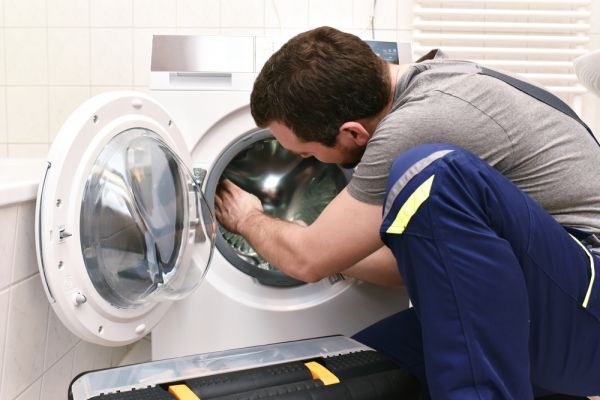
Best Top 10 Home Washing Machine Repair Tips

” If you have ever washed clothes without using the washing machine, you know the real struggle and value the invention of the washing machine more than others. Your washing machine is a lifeline, and it’s important to keep it running smoothly. But can you fix it yourself? The answer depends on finding the issue first. “
The washing machine is one of those appliances that you don’t think about very often. Sure, you’ve got your clothes and towels, but if something goes wrong with them, it’s not like you have a high-priority list of things to get done this month. But when an appliance breaks—whether it’s your dryer, fridge, or dishwasher—you need to address it soon.
Your washing machine is one of the most used appliances in your home. You probably use it at least once or twice a week, and if you’ve ever had to do laundry on a day when you had no electricity, you know that having a dependable washing machine is crucial.
But what happens when your washing machine breaks? What should you do if it gives you issues? And how can you prevent this from happening to you in the first place?
Washing machines are a great way to help you get your clothes clean. But they can also be a pain if they’re not working properly.
Understanding the mechanism of washing machine maintenance:
To understand its mechanism for functioning and understanding the language of the technician, there are some parts of the machine, you need to be familiar with.
- Drain hose: This is the part where the pipe is connected which helps in draining the water.
- Door gasket: The lock-like structure at the door that seals water and prevents leakage.
- Drum: The place where clothes are placed for cleaning.

There are some washing machine repair tips you'll need to take care of:
- First, turn off your machine and unplug it—even if it’s not broken. Turn off the electricity to your washing machine by unplugging it from the wall outlet or fuse box. If there’s no power coming into your home from an outside source, then there’s no way for electricity from inside to reach these parts either—so make sure that everything is shut off before even beginning any work on it!
- Turn off all water lines leading into your home—even if they’re not running at this time.
- If your washing machine is still working but has a leak or other defect, you may want to call a professional for help. But if it’s a minor problem, like a loose connection or an overflowing drain hose, then you can probably fix it yourself.
- Open up your washing machine door (turning off all of its lights in the process).
- Remove any plastic parts that might be stuck inside with pliers or similar tools.
- Call a professional if your washing machine is broken and there’s a lot of water in it. The last thing you want is for yourself or anyone else around you to get hurt or worse because of your stupidity.

Inspecting the machine:
- Make sure you have the right tools. Simple stuff: a wrench and Allen wrench set are great for this kind of thing. However, if you have a special tool that makes things easier (like reversing pliers), then use it.
- Inspect the door gasket. This is important because if there’s an issue with the gasket or seal where water leaks into the machine but doesn’t leak out (like if it’s warped), then water can be trapped inside and cause corrosion which leads to expensive repairs down the road. If there are any issues with this gasket or seal on your particular model of washing machine, replace it immediately.
- Check out the drain hose and ensure that the drum isn’t jammed or stopped up with lint from previous loads of laundry—you may need to use a small brush on the drum if this happens. Also check that there aren’t any metal objects inside the drum that could damage it during normal operation (like coins, buttons, etc).
- Make sure that your washing machine is always up to date with the latest repair instructions. These instructions will help you know what steps to take when something goes wrong.
- Fill out a repair request form if there’s anything wrong with the machine. This will help you get the best possible service from your manufacturer and make sure that any repairs are done on time.
Taking care of your washing machine is an important step to keeping it in good working order
Here are some of the best top 10 home washing machine repair tips for helping your washing machine last longer.
First of all, check the water levels in the machine—this will give you an idea of how much soap is being used for each cycle. If it’s low or empty, add more water. If it’s too high or overflowing, add less.
- Always use the right amount of detergent, even if you’re adding more than one wash at a time. Using too much can lead to clogged drains and leaks, which will result in extra work for you later on when it’s time to unclog your drain.
- Another thing that you can do to help prevent problems with your washing machine is to avoid using soap when you do laundry. You should also only use small amounts of detergent at a time so that it doesn’t build up in your pipes or drain lines. When in doubt, contact a professional technician who can come out and inspect your washing machine for any issues before they become costly repairs.
- Don’t use too much water or hot water while doing laundry because it can damage the washing machine and make it hard to clean properly later on.
- Make sure that water is not allowed inside the drum of the washing machine during operation (this includes when using under-the-sink models). If this happens, then condensation will form inside the drum, which will leave behind nasty mould stains once it dries out–so don’t let this happen.
- Do not let clothes sit in hot water that has been left running for too long (this could lead to mould growth). Instead, turn off the valve and allow them to cool down before putting them away so it won’t be exposed to any extreme heat.
- Don’t forget to clean the inside of your washer often. If you keep it clean and free of lint, you’ll have fewer problems with clogged drains, leaks, or other issues. You can also use special cleaners designed for this purpose (such as [company name]).
- Don’t overload your machine—this can lead to problems like damage or flooding when it fills up with water instead of clothes! Make sure that each load fits comfortably into the drum before adding more items.
- Use soft-bristled brushes on the drum and agitator to get out any stubborn stains that refuse to budge.
- Once every three months, take apart your machine and give it a good scrubbing with hot water and dish soap. This will get rid of any dirt that has settled over time.
- Do not overload your washer or dryer. It can cause damage to your machine and increase the risk of leaks or electrical issues later on down the road.
- Refrain from washing heavy materials like beaded apparel or any other materials.
Washing machine repair is a common household chore, and there are a lot of things you can do to make it easier on yourself.
Even if something goes wrong, you can always call technicians and washing machine repair service assistants near you by simply typing in google ‘washing machine technician/repair near me or washing machine technician/repair in Nagpur.’

Share
Category
Popular Posts


Top 5 Best Home Refrigerator Maintenance Tips

